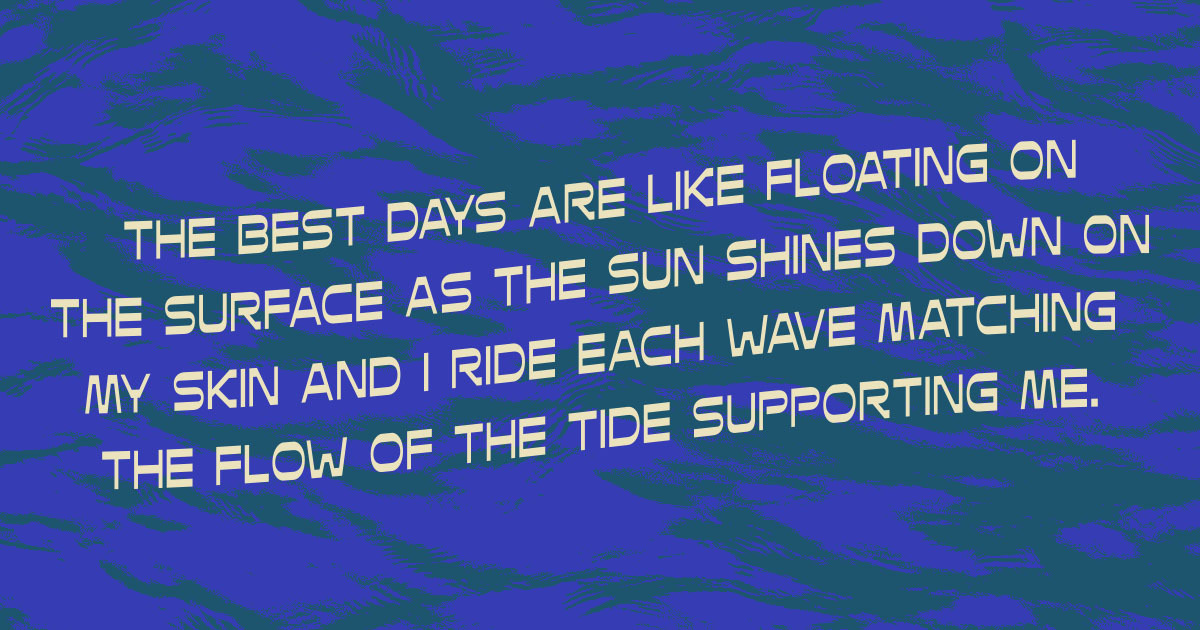I’ve always felt that my experiences with depression felt like drowning as you’re lost at sea. On the worst days, it’s like I’m stuck at the bottom of the ocean, looking up at the light shining through the water without the strength to swim up because an anchor is keeping me down. Better days can feel like treading water, just able to keep my head above water—but my energy will only last so long. The best days are like floating on the surface as the sun shines down on my skin and I ride each wave matching the flow of the tide supporting me.
If life is crossing the ocean in search of shore, most people will reach land using a boat, a navigation system, and maybe a life vest just in case. Many people have a fair-sized boat with an engine, nothing extravagant, but it will get them across the water and they have most, if not all, of the supplies they need. Some have more than they need and cross the ocean on a ship manned with a whole crew and more than enough supplies for the journey, while others are not so lucky with smaller boats, a broken compass, and no life vests on board.
When I feel good, I’m heading toward shore in a small boat, maybe not quite equipped for the ocean but strong enough to make the journey. As I fall lower into depression, my journey grows more tiring. I’ve lost my engine and have to manually paddle to shore or sometimes I’ve lost my boat entirely and I’m left to rely on a life vest to remain afloat.

During the lowest points in my life, I’m forced to swim, no longer wearing the safety of a life vest, fighting the waves on my own as I try to approach the shore alongside those still in their boats. At first, I’m defiant and keep swimming, even refusing the life vests and buoys passing boats throw me—because I’m strong enough to make it on my own. As I fall farther behind and lose energy and strength, I kick harder and pull faster in a frantic, last-ditch effort to get to land. When I realize I can’t sustain this for much longer, I stop to catch my breath and look around. I see that the shoreline is nowhere to be found. I call out for help, but I’ve fallen so far behind that the others can’t hear me, can’t see me, and don’t know I need help.
These days I move towards the shoreline already wearing a life vest in my small but mighty boat. When the waves turn rough and I’m tipped overboard, I take the lifeline thrown to me, holding the buoy allowing myself to rest until I feel strong enough to pull myself back up, ready to steer again with hopes of making it to the shore.
Depression has a way of making us feel incredibly isolated. We’re here to remind you of the truth that you are not alone. We encourage you to use TWLOHA’s FIND HELP Tool to locate professional help and to read more stories like this one here. If you reside outside of the US, please browse our growing International Resources database. You can also text TWLOHA to 741741 to be connected for free, 24/7 to a trained Crisis Text Line counselor. If it’s encouragement or a listening ear that you need, email our team at [email protected].
Kimberly
Would love to read this
Karen Fernanda romero ahuesta
Hola mi nombre es Karen Ahuesta soy madre de 3 niños y nose que me pasa es complicado expresarme solo se que no encuentro una dirección correcta ala vida y me e perdido en todos los sentidos requiero de ayuda ya que mi estado esta afectado amos hijos
TWLOHA
Hola Karen, gracias por contactarte. ¿Puede enviar un correo electrónico a nuestro equipo en [email protected] para que podamos obtener más información sobre su historia, brindarle aliento y conectarlo con recursos? Estamos muy contentos de que estés aquí. Hay esperanza y la sanación es posible.